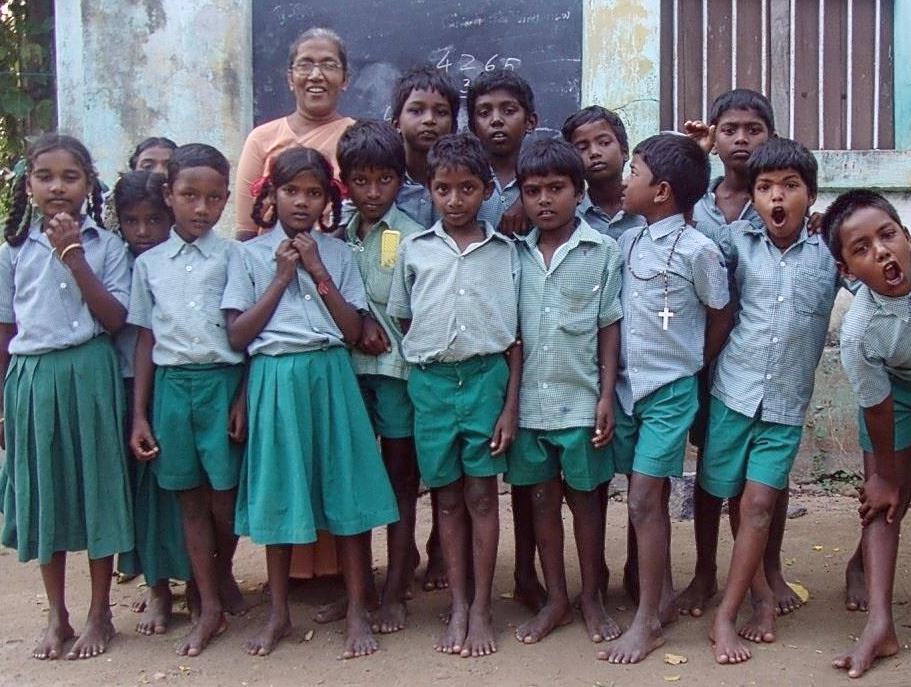
Indian Religion: Toleration

Figure 1.--The photo was taken in a village school located in the Telangana region of Andhra Pradesh, India.
Notice how one boy is a Christian and feels feee to declare this openly even though Christians are a very small minority. This would not be possible in Muslim majority Pakistan. Despite the remarkable history of toleration, there are incidents of relgious intolernce. One of the most serious such incidents was Hindu attacks on Christians in Orissa (2008).
|
|
One of the most impresive achievements of India, in addition to creating the world's largest democracy, is religious toleration. Tolerance is an integral part of Indian life a tradition extending back to ancient times. One author sees tolerance as India’s true national identity. There have been periods of intolerance such as the Mogul Muslim rulers following Akbar (17th century) and the terrible out breaks of communal violence with partition of the Raj (1947-48). India today is a vibrant multi-religious and higly tolerant society. And with a few exceptional incidents, Indian people of all religions live in peace and harmony. This is an important part of the identity of the Indian nation. India is a predominntly Hindu nation, but there is a substantil Muslim minority as well smaller number od many othef religion. There is complete religious freedom for all of these groups. Muslim leader Muhammad Ali Jinnah did not think this was possible and demanded partition to crate a separate Muslim state. This was the genesis of Pakistan. But in Pakistan the tolration and religious diversity of India was lost. Ironically, there is more toleration and religious freedom for Muslims in India than Pakistan. Today in Pkistan not only are non-Muslims common targets of violence, but Muslims who do not adhere to the majority Sunni deomination. The tolerant religious tradition was strengthen by the British Raj, but it was a long-established traditioin well before the arrivl of the British. It is an important component of the Indian way of life. Indians believe in plurality or as the great independence leader Mahatma Gandhi phased it, 'the manyness of reality'. Gandhi had virtually insane economic ideas, but his philospical ideas have inspired people around the world, including Martin Luther King in America and invigorated the Civil Rights movement. Ghandi like most Indians are Hindu and the impulse for toleration has come primarily from Hindu thought. The Hindu religion is centered on 'advait vad'--monism. Monism is the philosophical and religious view that all variety of existing things can be explained in terms of a single reality or substance, albeit manifested in different ways. Hindus believe that everything in the cosmos is an 'ansh', or part, of divinity. They believe in the concept of an indwelling god. Every human has having a content of divinity. Hindu theology accords equal value to all human life, although this sems hard to reconcile with the caste system. This is, however, the source of the culture of Indian tolerance. It shoud not be thought that India is a perfect society. Despite the remarkable history of toleration, there are incidents of relgious intolernce. One of the most serious such incidents was Hindu attacks on Christians in Orissa (2008).
HBC

Navigate the Boys' Historical Clothing Web Site:
[Return to the Main Indian religion page]
[Introduction]
[Activities]
[Biographies]
[Chronology]
[Clothing styles]
[Countries]
[Girls]
[Topics]
[Bibliographies]
[Contributions]
[FAQs]
[Glossaries]
[Images]
[Links]
[Registration]
[Tools]
[Boys' Clothing Home]
Navigate the Boys' Historical Clothing national pages:
[Return to the Main countries page]
[Australia]
[Belgium]
[China]
[England]
[France]
[Germany]
[India]
[Indonesia]
[Ireland]
[Italy]
[Japan]
[Korea]
[Malaysia]
[Mexico]
[The Netherlands]
[Portugal]
[Scotland]
[Spain]
[United States]
Created: 11:59 PM 5/28/2014
Last updated: 11:59 PM 5/28/2014



